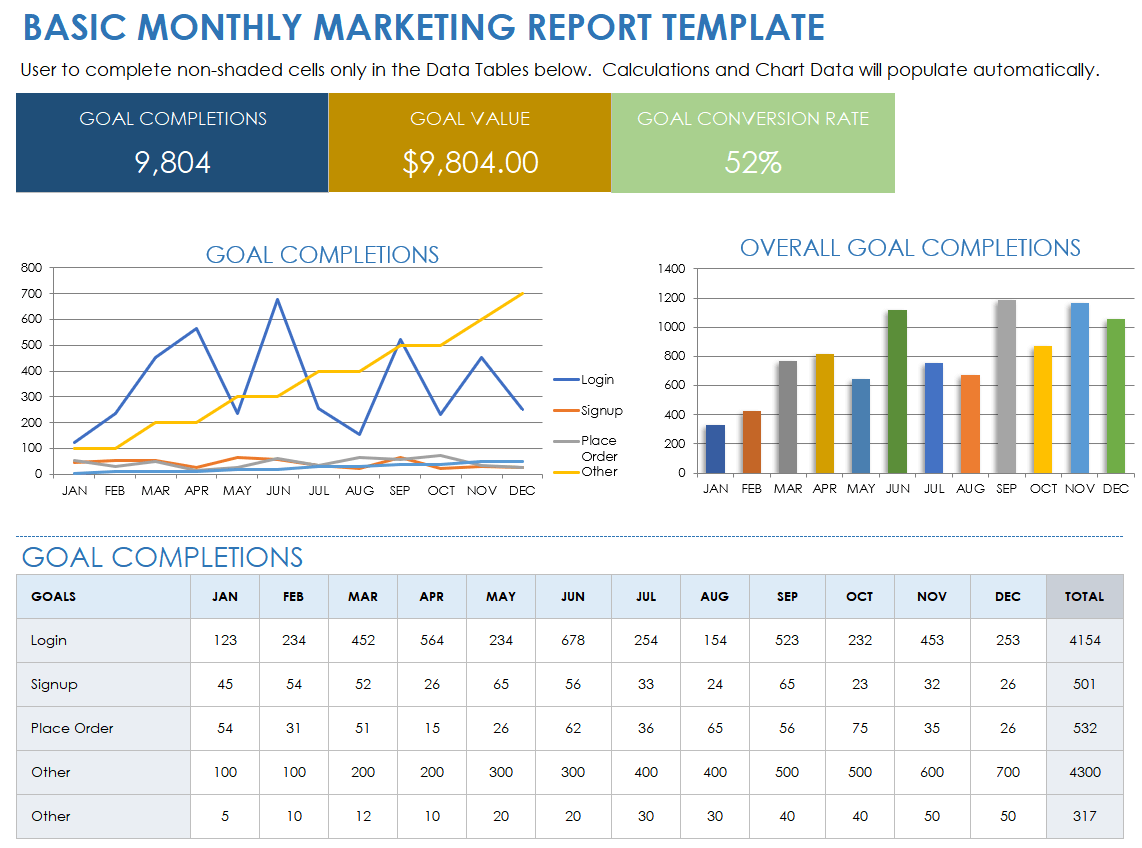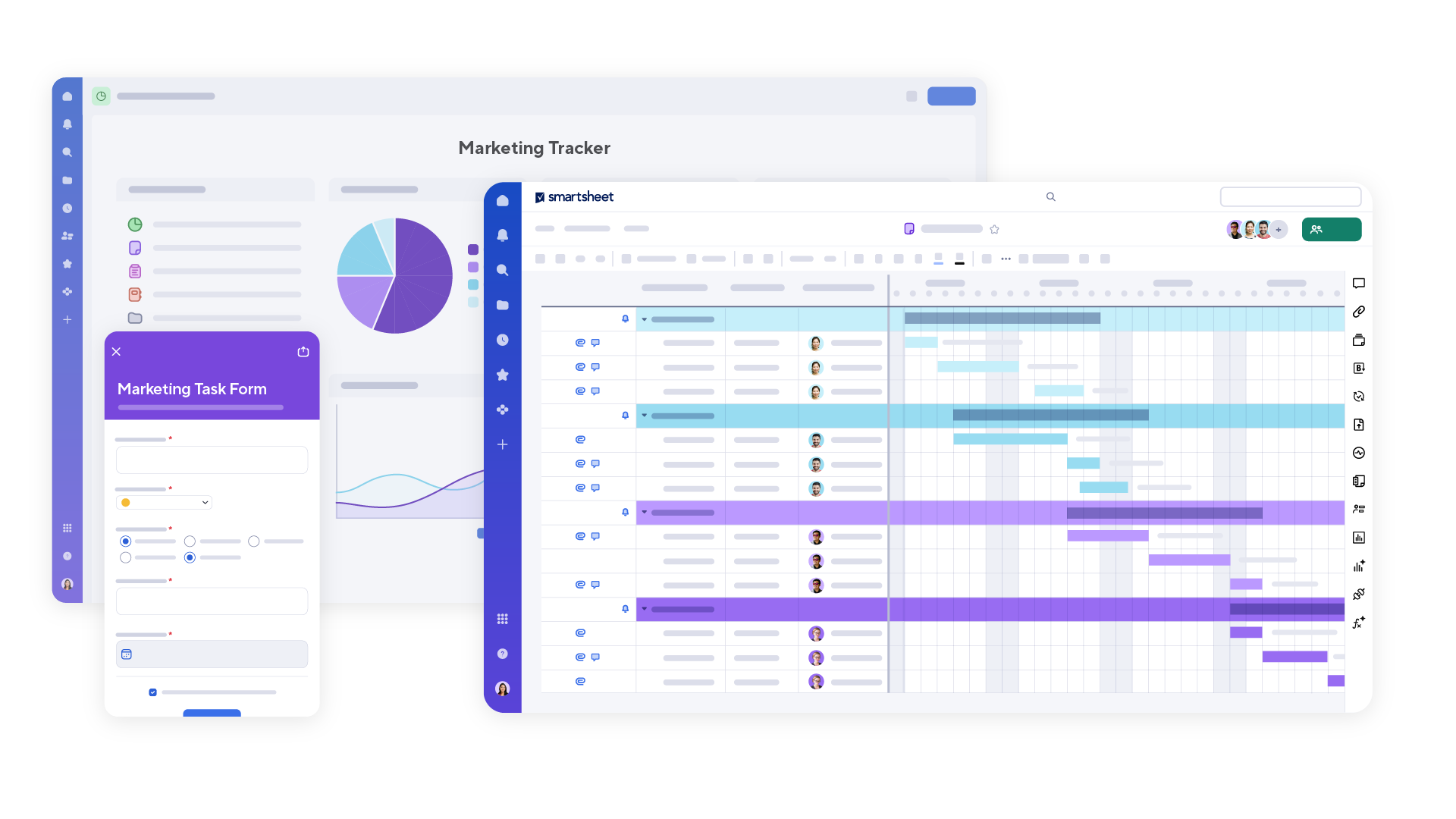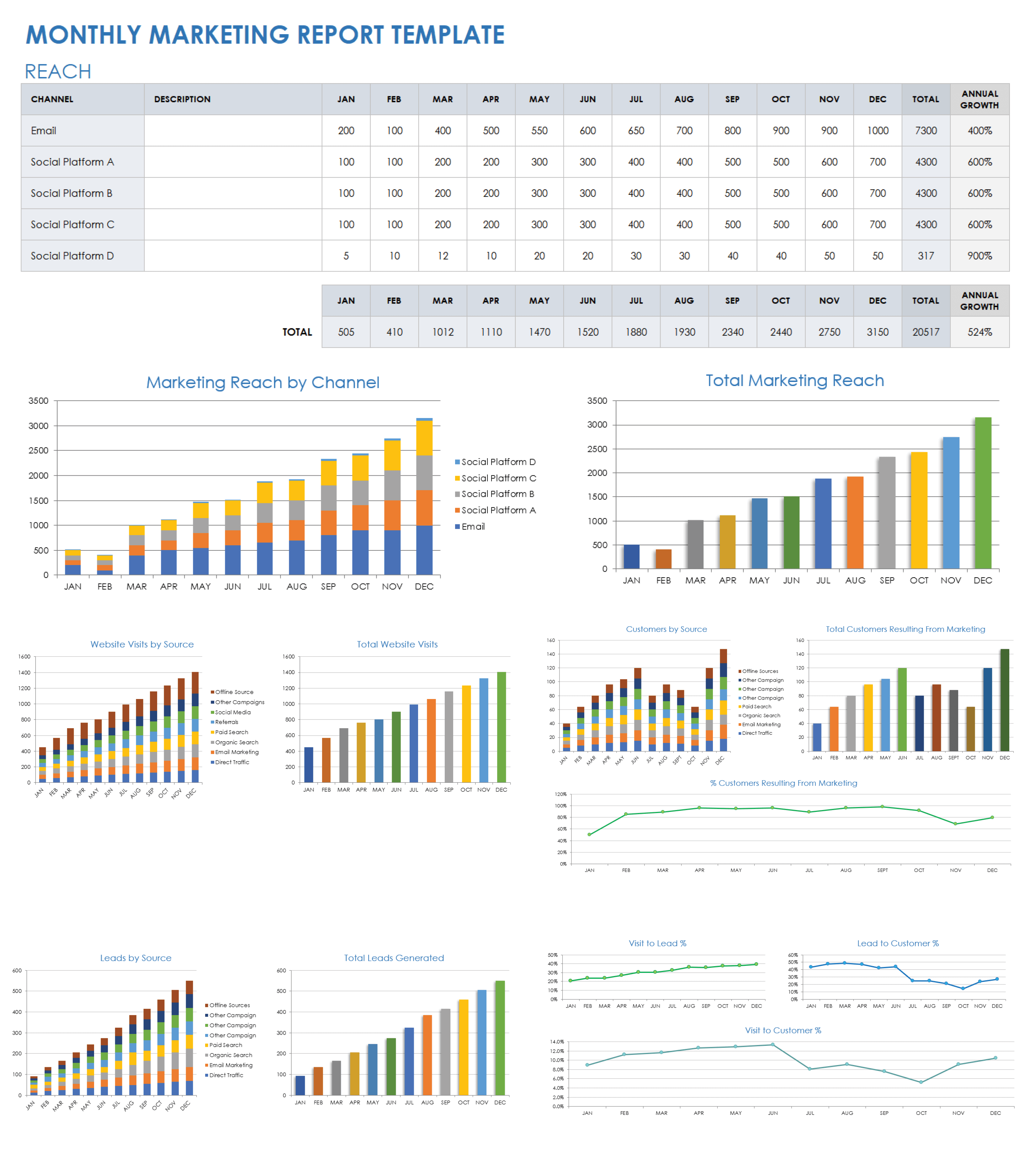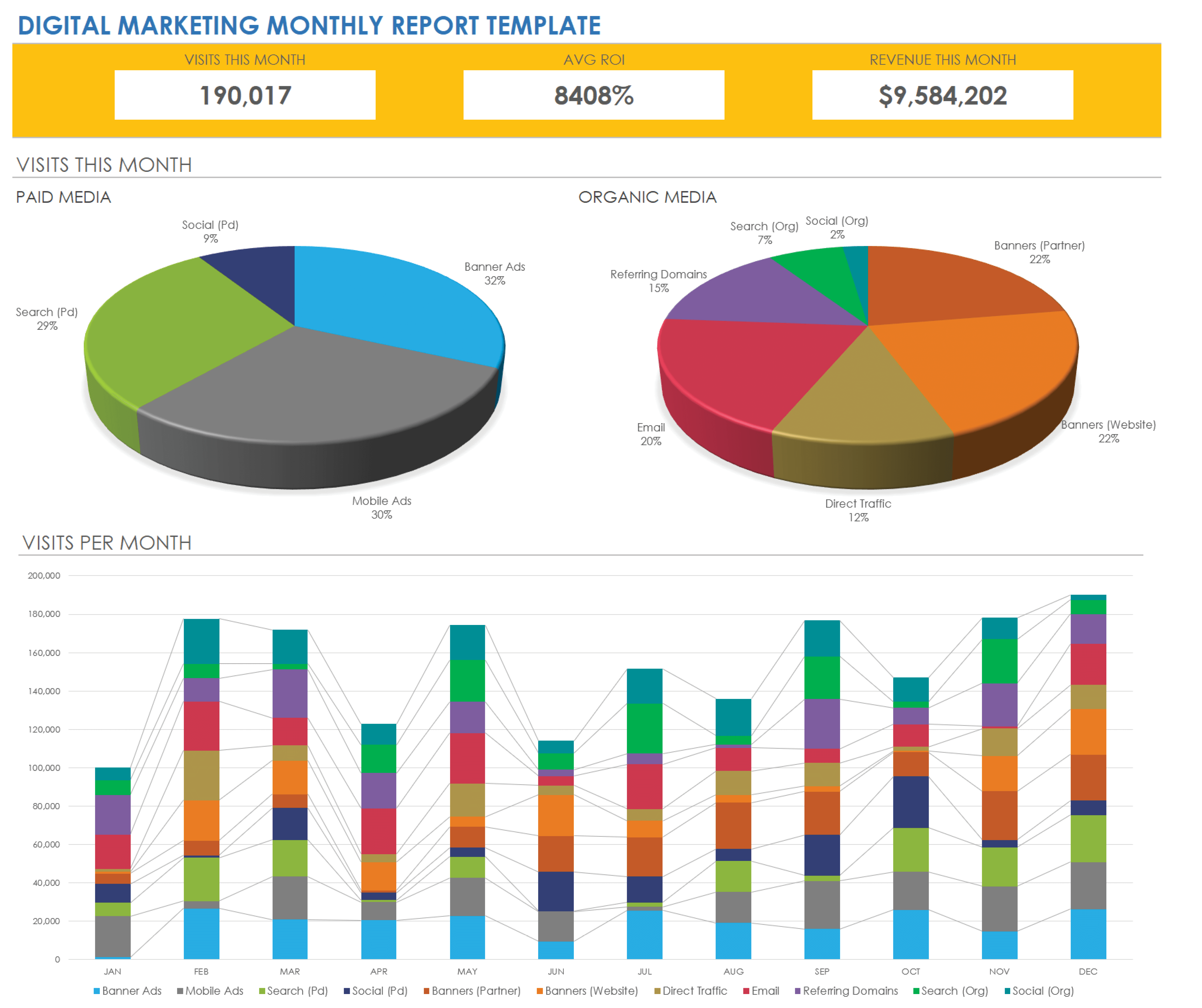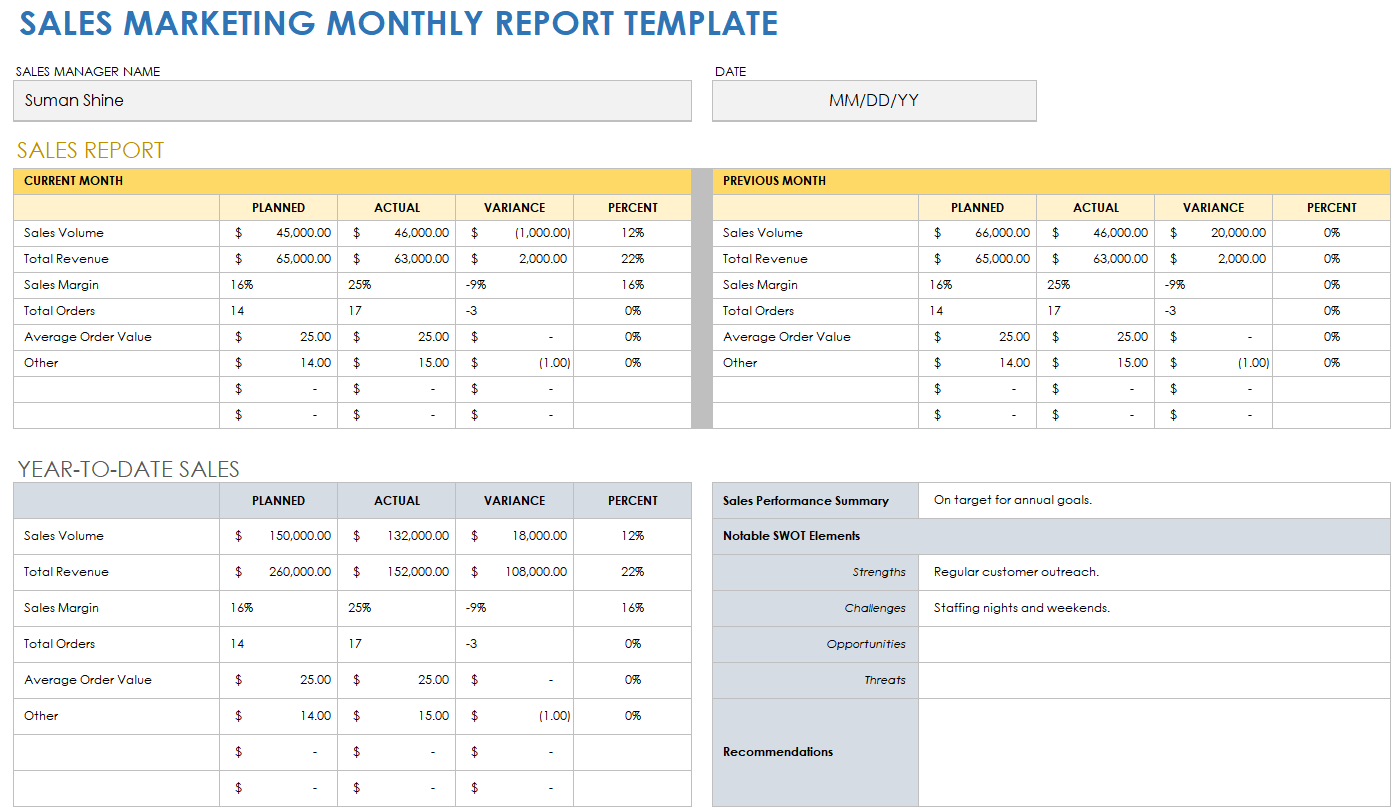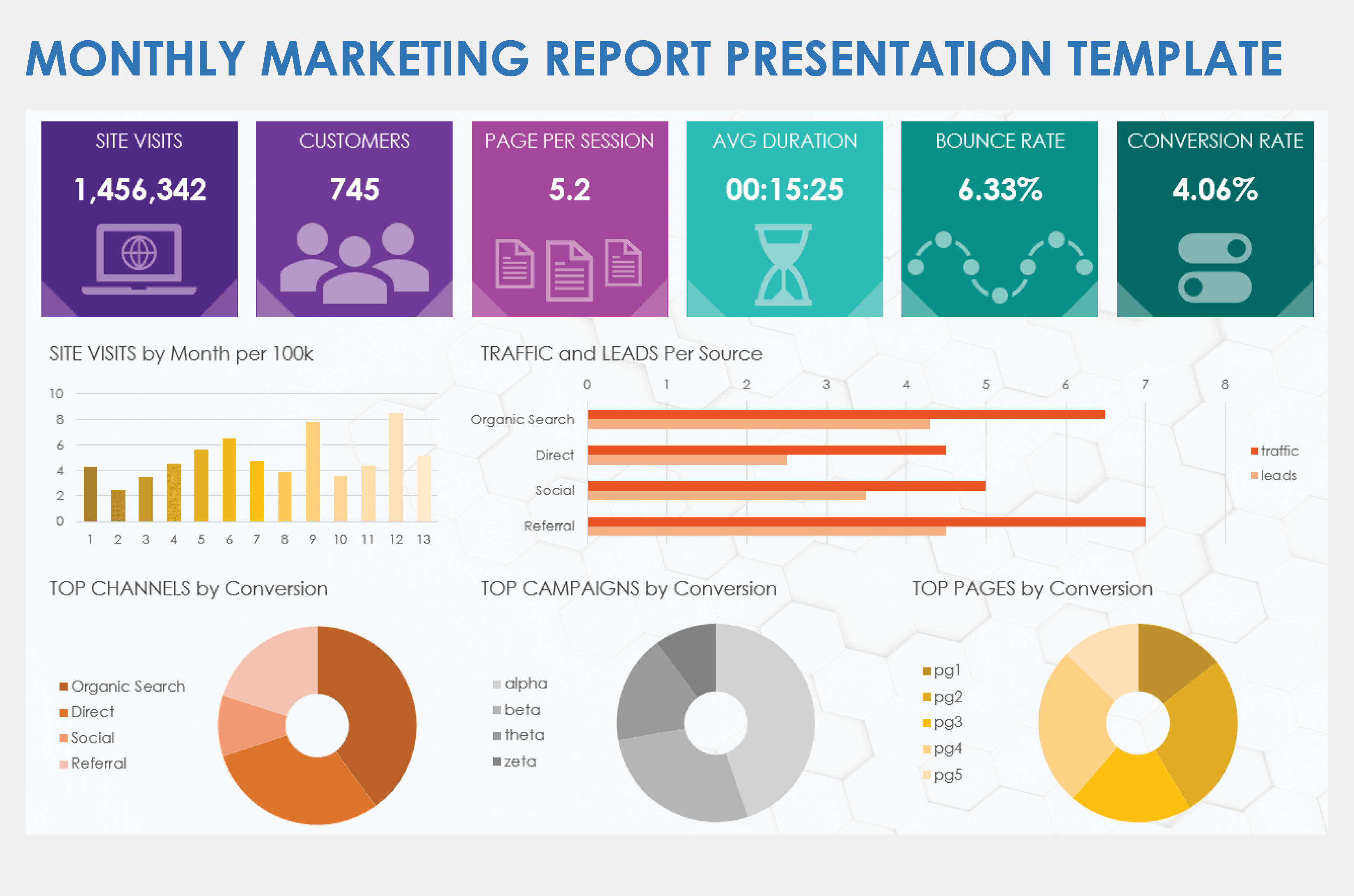Basic Monthly Marketing Report Template for Excel
Download the Basic Monthly Marketing Report Template for Excel
Use this basic monthly marketing report template to effectively analyze your marketing endeavors, improve your strategies, and grow your business. Easily track the completion rate, value, and conversion rate for each marketing goal in a visually dynamic dashboard that populates automatically as you enter your data. This basic monthly marketing report template is the perfect solution for organizations looking to track and improve key goals, leading to informed decisions and business growth.
Monthly Marketing Report Template
Download a Monthly Marketing Report Template for
Excel
| Google Sheets
This comprehensive monthly marketing report template is ideal for helping you set, track, and reach your marketing goals. It has everything you need to quickly grasp trends, make informed decisions, and improve your strategies. You’ll find space for tracking metrics such as site visits, leads, and conversion rates. Vertical bar charts can display your marketing reach by channel, total marketing reach, website visits by source, total visits, and more.
Digital Marketing Monthly Report Template for Excel
Download the Digital Marketing Monthly Report Template for Excel
Maximize your online presence with this visually dynamic digital marketing dashboard template, designed for tracking comprehensive online marketing analytics. Monitor monthly paid media visits, organic media visits, and total visits per month. This visually rich template helps you evaluate the alignment of paid promotions and organic search traffic with your marketing objectives, all while computing average ROI and total monthly revenue.
For more resources on marketing metrics in dashboard format, check out this collection of free marketing dashboard templates.
Sales Marketing Monthly Report Template
Download a Sales Marketing Monthly Report Template for
Excel
|
Microsoft Word
|
Adobe PDF
Sales involves selling products or services directly to customers, while marketing involves promoting products to attract or retain customers. This template allows you to track important metrics for both. Simply enter your monthly sales data into the template. It will calculate both the current month's sales and the total sales for the year, helping your team better understand trends and refine marketing strategies for better results.
Check out these free sales report forms and templates for more sales resources.
Monthly Marketing Report Template for PowerPoint
Download the Monthly Marketing Report Template for
Use this dashboard-style monthly marketing report template to visually present and analyze marketing data. Input your data on metrics such as website traffic, page per session (PPS), average duration, bounce rate, and conversion rates. The template automatically streamlines data communication and enhances communication around the effectiveness of your marketing strategies.
What to Include in Monthly Marketing Reports
In a monthly marketing report, include key performance indicators (KPIs) such as website traffic, social media engagement, conversion rates, and ROI. In addition, highlight notable campaigns, analyze trends, and provide insights to demonstrate the effectiveness of your marketing strategies.
A well-structured monthly marketing report consolidates data on customer segmentation and behavior, detailing which segments are responding best to campaigns. It might incorporate heatmaps or click-through data to visualize user interaction patterns, delve into user personas' responses, and explore competitive landscape changes to understand market dynamics. Furthermore, it can offer a section on lessons learned and actionable recommendations.
You might also incorporate a section detailing the allocation of your marketing budget across different channels. When you include customer retention metrics such as churn rate and repeat purchases, you get a comprehensive view of customer loyalty. Integrating qualitative feedback from customer interactions provides context to the quantitative data, enriching the report with real-world perspectives.
Here are several items to consider including in your monthly marketing report:
- High-Level Overview: Whether with an executive summary or with dashboard-style data, provide a concise overview of key marketing achievements, challenges, and trends observed during the month.
- KPI Performance: Include data on KPIs such as website traffic, conversion rates, and social media engagement.
- Campaign Insights: Analyze recent marketing campaigns, including information about strategies, reach, and impact.
- Goal Progress: Note any progress made toward meeting monthly marketing goals, highlighting successes and areas for improvement.
- Competitor Analysis: Compare your performance against competitors' activities and market trends.
- Channel Breakdown: Provide information on performance across various marketing channels, such as email, social media, and paid advertising.
- Lead Generation: Enter metrics related to lead-generation efforts, such as sign-ups, inquiries, and downloads.
- Content Performance: Assess the effectiveness of your content marketing, including blog posts, videos, and other assets.
- ROI Calculation: Calculate the return on investment (ROI) for specific campaigns or marketing activities.
- Future Recommendations: Suggest strategies and optimization methods based on data insights to improve future marketing efforts.
By including these items in your monthly marketing report, you can enhance the report's transparency, allowing stakeholders to comprehend the financial implications, customer relationships, and human insights driving marketing outcomes.
How to Create a Monthly Marketing Report
When creating a monthly marketing report template, be proactive and adaptable. By foreseeing possible challenges and creating a detailed outline of strategies, businesses can mitigate the effects of unexpected shifts and guarantee consistent tracking of marketing metrics and strategies.
Here are some key steps to follow when creating a monthly marketing report:
- Gather Data: Collect relevant data from various sources such as website analytics, social media platforms, and sales records.
- Choose KPIs: Select the most important KPIs that reflect your marketing goals and objectives.
- Use a Template: Choose an existing monthly marketing report template, and customize it to be sure you’re capturing all of the KPIs you need. For example, using a template to track return on advertising spend will enable your team to evaluate the effectiveness of advertising campaigns and make informed decisions for future marketing investments.
- Analyze Trends: Examine month-to-month trends and changes in KPIs to identify growth patterns or areas of concern.
- Evaluate Goals: Assess whether you achieved your set marketing goals for the month.
- Identify Insights: Extract meaningful insights from the data to inform strategic decisions and optimizations.
- Address Challenges: Discuss any challenges or setbacks encountered during the month, and outline potential solutions.
- Highlight Successes: Showcase successful campaigns, initiatives, or improvements that contributed to positive results.
- Align the Budget: Compare marketing expenses to the outcomes achieved and assess ROI.
- Plan Ahead: Suggest strategies and adjustments based on data analysis for the upcoming month's marketing efforts.
Keep in mind that it’s important to proactively review your monthly marketing data to ensure that you, your team, and other stakeholders all stay informed about your marketing performance.
Monthly Marketing Report Best Practices
Creating an effective monthly marketing report involves tracking key metrics such as website traffic, conversion rates, and social media engagement. Highlight significant campaigns, analyze trends, and share insights to demonstrate marketing impact and shape future marketing strategies.
“Marketing teams can get buried in data and metrics, making it harder to move from insights to decisions,” says Cari Jaquet, Chief Marketing Officer at CoreView. “Make sure you have defined a short set of questions you want data to help you answer, then expand the list of questions as you go. And make sure you have the right data to help you answer them. For example, if your top-level objective is to understand how much you spend to acquire a customer, make sure you assign campaign costs in your CRM or marketing automation system, along with a per-lead allocation, so getting to the answer is a lot simpler.”
Be sure to apply the following essential monthly marketing report best practices to effectively showcase your marketing efforts and guide strategic decisions:
- Clear Objectives: Define distinct goals and objectives for your report to ensure it aligns with your marketing strategy.
- Relevant KPIs: Select and emphasize the KPIs that are most relevant to your goals.
- Consistent Format: Maintain a consistent and organized format that is easy to follow and understand.
- Visual Presentation: Utilize visuals such as graphs and charts to present data in a visually engaging manner.
- Comparative Analysis: Include month-to-month or year-to-year comparisons to highlight trends and improvements.
- Data Accuracy: Ensure accuracy by using reliable data sources and verifying the integrity of the information presented.
- Contextual Insights: Provide insights and explanations for the data presented, helping stakeholders understand its significance.
- Actionable Recommendations: Include actionable recommendations based on data insights to guide future marketing strategies.
- Regular Review: Schedule regular review meetings to discuss the report's findings with relevant stakeholders and to help make informed decisions.
Remember, the best practices you implement should be tailored to your specific business objectives, industry, and audience to create a meaningful and impactful monthly marketing report.
Related Marketing Templates
Monthly marketing report templates streamline the reporting process by offering a consistent structure for showcasing key metrics, campaign highlights, and insights. This not only saves time but also ensures clarity, enabling you to present comprehensive, organized, and visually appealing reports.
Check out any of the following diverse and customizable marketing templates designed to streamline your reporting process and effectively communicate your marketing efforts.
- See this free marketing plan template to guide you in systematically outlining your marketing goals, strategies, and tactics to achieve desired business outcomes.
- See this free content marketing planning template to help you strategically organize and schedule your content creation efforts, ensuring consistent and targeted messaging to engage and attract your audience.
- See this free digital marketing plan template to assist you in mapping out your online marketing strategies, channels, and campaigns to effectively reach and engage your target audience in the digital landscape.
- See this free marketing project management calendar template to enable you to meticulously schedule, track, and coordinate various marketing tasks, ensuring efficient project execution and timely delivery of campaigns.
- See this free marketing strategy template example for a practical framework that helps teams understand how to structure and present their marketing strategies.
- See this free marketing strategy slide deck template to visually convey your marketing plans, objectives, and tactics in a concise and engaging manner.
- See this free sales and marketing plan timeline template to assist you in plotting out a strategic schedule of sales and marketing activities, providing a clear visual representation of key milestones.
- See this free marketing performance dashboard template to provide a comprehensive and informative snapshot of your marketing metrics, allowing you to track key indicators, assess campaign effectiveness, and make data-driven decisions.
Get the Most Out of Your Marketing Reports with Smartsheet
Empower your people to go above and beyond with a flexible platform designed to match the needs of your team — and adapt as those needs change.
The Smartsheet platform makes it easy to plan, capture, manage, and report on work from anywhere, helping your team be more effective and get more done. Report on key metrics and get real-time visibility into work as it happens with roll-up reports, dashboards, and automated workflows built to keep your team connected and informed.
When teams have clarity into the work getting done, there’s no telling how much more they can accomplish in the same amount of time. Try Smartsheet for free, today.
